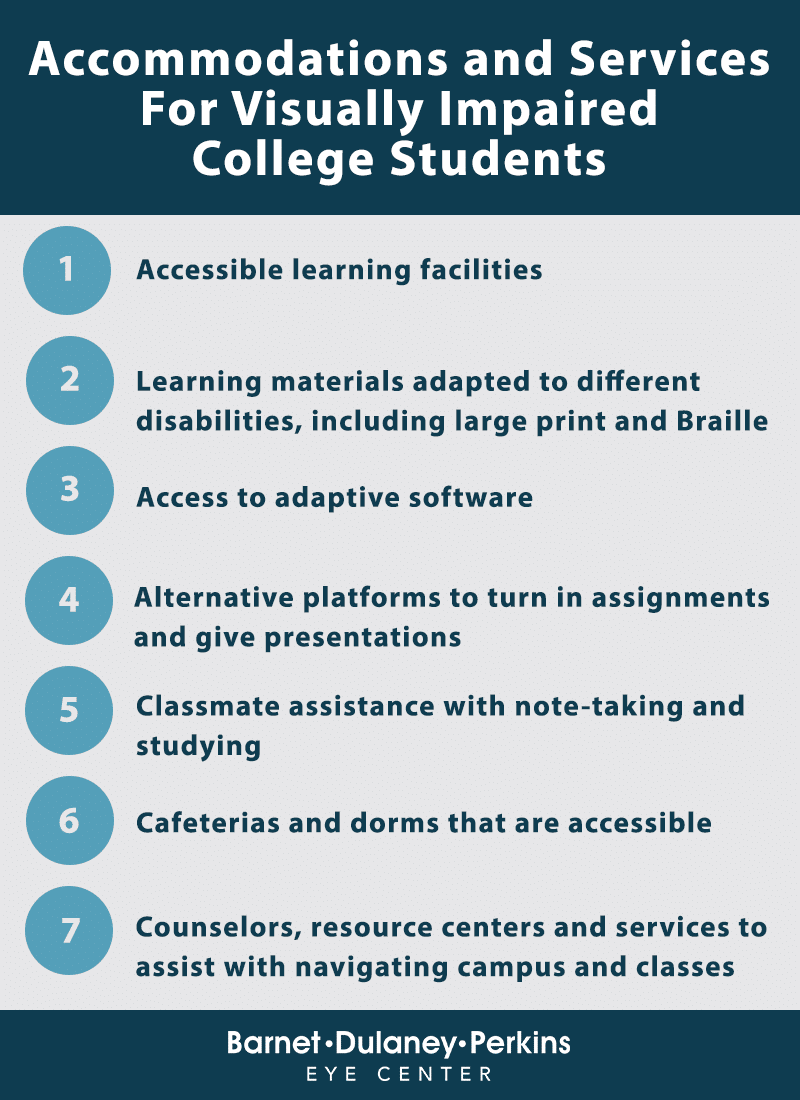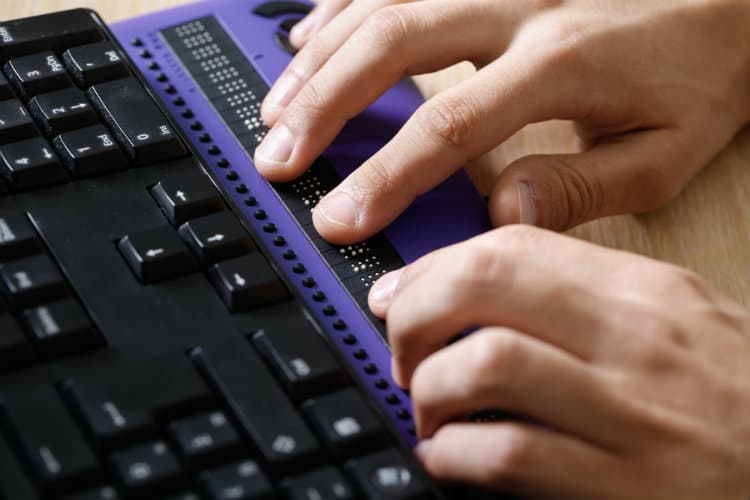If you’re a college student, you’re in a situation that’s filled with unknowns, high expectations and continual pressure. It’s natural to experience many highs and lows throughout your academic career, but with planning and self-advocacy, you can experience academic achievement and fulfillment by gathering resources for visually impaired students.
This article shares some resources, tools and school services that you can utilize to succeed during your college years.
Facts about Students with Vision Disabilities
A 2017 National Health Interview Survey conducted by the American Foundation for the Blind found that 26.9 million U.S. adults (age 18 or older) experience vision loss, which is defined as having trouble seeing even with aids like glasses and contact lenses and includes individuals who can’t see.
In 2016, the National Federation of the Blind reported the following levels of educational attainment for non-institutionalized individuals with a visual disability between ages 18 and 64:
- Not a high school graduate – 22.3%
- High school graduate or GED – 31.6%
- Some college/associate degree – 30.3%
- Bachelor’s degree or higher – 15.7%
There’s a marked drop off between the some college and bachelor’s degree or higher categories, which could indicate that there are obstacles for students with vision disabilities during the four-year college journey.
This theory is supported by the 2015 Disabilities Survey conducted by Cornell University. Vision disability doesn’t appear to be a barrier to starting college, because 30.6% of vision disabled persons have an associate degree or completed some college, in comparison to 31.9% of individuals without disabilities.
However, the survey shows that 33% of individuals without disabilities held bachelor’s degrees or higher in the U.S. in 2015, but only 14.9% of persons with a vision disability had at least a bachelor’s degree. This underscores the importance of college students having access to resources for visually impaired students throughout their educational journey.

Let’s review the assistive technology that you can use to enhance productivity and independence during your college journey.
Tools for Visually Impaired Students
There are a variety of tools for each level of visual disability to help you study and complete assignments while taking advantage of college life. The tools below are categorized by their purpose.
Magnifiers and Reading Devices
Magnifiers
Some of these assistive devices use a camera and screen so individuals with low vision can magnify text to make it easier to read. There are two primary types:
- Desktop: These magnifiers have a reading table so you’re able to read printed materials, such as books and newspapers.
- Portable: These are lightweight, hand-held devices that are easy to carry and use. They’re ideal for reading small print, maps and directories.
Screen Readers
Visually disabled students can convert onscreen text to speech by using a speech synthesizer. These devices allow students who are severely visually disabled or who experience fatigued eyes to study course materials. Some of these tools have the capability to spell-check, read data in cells and utilize a find function to locate specific information in a document or spreadsheet.
Optical Character Recognition (OCR)
Similar to a screen reader, OCR systems scan printed text and convert it into audible speech. Some of these devices are handheld. Users can scan text and images and the OCR will convey information through an earpiece.
Writing and Printing Tools

Braille Keyboard Stickers
These transparent stickers are imprinted with braille to make it easier for visually impaired students to input data and type. Because the stickers are see-through, sighted students can see the key character under the sticker, so they can easily use the keyboard, too.
Braille Printers
Information from computers or hand-held devices can be converted into Braille for individuals who prefer to use braille to gather or manage information. Simply scan and the page will be printed. The paper Braille Printers used is thicker than basic printers.
Calculators
Low-Vision and Talking Calculators
Math calculation can be challenging if you have a vision disability. The adaptations for these specialized calculators can be as simple as larger keys or as fun as speaking the results of the calculation. You’ll find many affordable options.
Organizers
Portable Recorder
Keep track of lectures, study sessions and all important events with a portable recorder specifically made for the visually impaired. Buttons are larger and with simplified, straightforward options so the recorder is easy to use.
Software and Apps
Ariadne GPS
This app can be downloaded onto your Apple device so that you can know your location, no matter where you are. Ariadne GPS can be used to navigate around campus easier — information is conveyed by a talking map and you can ask for information about your location any time.
Braille Translator
Many Braille translator software systems translate text from print to braille or braille to print and are compatible with word processing programs, like Microsoft Word. There are some that also include foreign language translations, along with the standard American or British English.
Screen Magnification
This magnifying software is ideally suited for low vision because it enlarges the graphical output of your computer between one and 16 times the original size. If you have a severe visual disability, a screen reader is more appropriate.
Tips for Managing College Life
The most important resource you have is the ability to advocate for yourself. Before enrolling at a college, ask about the school’s resources for visually impaired students and how they’ll support you. Choose a school with comprehensive services.
Public colleges and universities are required to make programs accessible for all students, which requires accommodations in learning materials and formats. The Americans with Disabilities Act and Rehabilitation Act makes it a legal requirement — advocate for your rights. Here’s a list to help facilitate your success:
- Register with the college’s equivalent of a Disabilities Service Department to qualify for accommodations
- When attending class, have all assistive technology available
- Scope out resources, including organizations and clubs that make your college experience easier and more fun
- Check out free tutoring services at your college
- Develop time management skills
- Join a study group to develop accountability
- Download The Adult Learner Handbook for a comprehensive, free resource
- Take full advantage of your college life

Make your health a priority while you’re in school — it makes a difference if your mind and body are in good form. If you’re attending classes on-campus, find out whether there is an on-campus medical center. While you’re there, ask if they have additional wellness resources, such as:
- Nutritional classes, handouts and other events to help you maintain overall health
- Exercise classes and whether there’s assistance if you’d like to attend these classes
- Whether there are free mental health counseling resources at the medical center
Also, check out on-campus food courts and cafeterias. If there are several cafeterias, one may specialize in healthy fare or offer food that’s allergy-friendly and supports restrictive diets.
Important Organizations
Even though your success depends on a sense of independence and self-reliance, it’s equally important to reach out to the resources that are available to you. Find partners in your journey. There are many non-profit associations that are advocates for disabled populations. Here are a few that provide resources for visually impaired students:
- American Foundation for the Blind is a national nonprofit that provides learning courses and resources
- Associated Services for the Blind and Visually Impaired offers rehabilitation and adaptive training
- The Chicago Lighthouse provides services that include a low-vision clinic, independent living resources and employment services
- Helen Keller Services for the Blind provides college preparatory courses, training and employment services
- National Association of Blind Students connects students with leadership resources in their state
Partner with Trusted Ophthalmologists
The health of your eyes is critical through your college years and beyond. Our ophthalmologists not only recognize this, but they’re experienced in treating and managing visual impairments. Partner with a practice that has been voted the No. 1 Eye Care Center in Arizona from 2013 to 2019. Our doctors are standing by to help you.
Contact Barnet Dulaney Perkins to make an appointment today.

